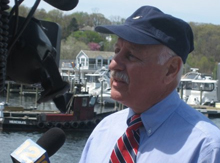Kenneth P. LaValle
| Kenneth P. LaValle | |
|---|---|
 |
|
| Member of the New York Senate from the 1st district |
|
|
Assumed office January 1, 1977 |
|
| Preceded by | Leon E. Giuffreda |
| Personal details | |
| Born |
May 22, 1939 Brooklyn, New York |
| Political party | Republican |
| Spouse(s) | Penny LaVelle (2 children) |
| Residence | Port Jefferson, New York |
| Alma mater |
Adelphi College (B.A.) SUNY New Paltz (M.S.) Touro College (J.D.) |
| Website | Official website |
Kenneth P. LaValle (born May 22, 1939 in Brooklyn, New York) represents District 1 in the New York State Senate, which comprises the five East End towns of Long Island, New York, and the eastern half of the Town of Brookhaven, New York. First elected in 1976, he is the chair of the Higher Education Committee in the State Senate.
He is the former executive director of the Education Committee. He is also a member of the Agriculture, Education, Finance and Rules committees, among other standing committee assignments. He was elected to another two-year term in 2014. LaVelle is a Republican.
Born in Brooklyn, LaValle graduated from Hempstead High School. He received a B.S degree from Adelphi College in 1961 and an M.S. in Education from SUNY New Paltz in 1964. He received a Juris Doctorate from the Touro College Jacob D. Fuchsberg Law Center.
Senator LaValle is the father of two grown children and he resides in Port Jefferson, New York, with his wife, Penny.
The Kenneth P. LaValle Stadium at Stony Brook University bears his name.
LaValle first ran for the New York Senate in 1976 to succeed retiring Senator Leon E. Giuffreda, and won with 51% of the vote against Democrat Barry McCoy. He has won every election since with at least 60% of the vote.
In 2007, the Governor appointed Senator LaValle to the New York State Commission on Higher Education, which was charged with identifying ways of improving the quality of higher education in the State. Senator LaValle also served on the National Council of State Legislatures’ Blue Ribbon Commission on Higher Education, whose goal was to create awareness among State Legislatures of their role in providing accessible and affordable public higher education.
...
Wikipedia
